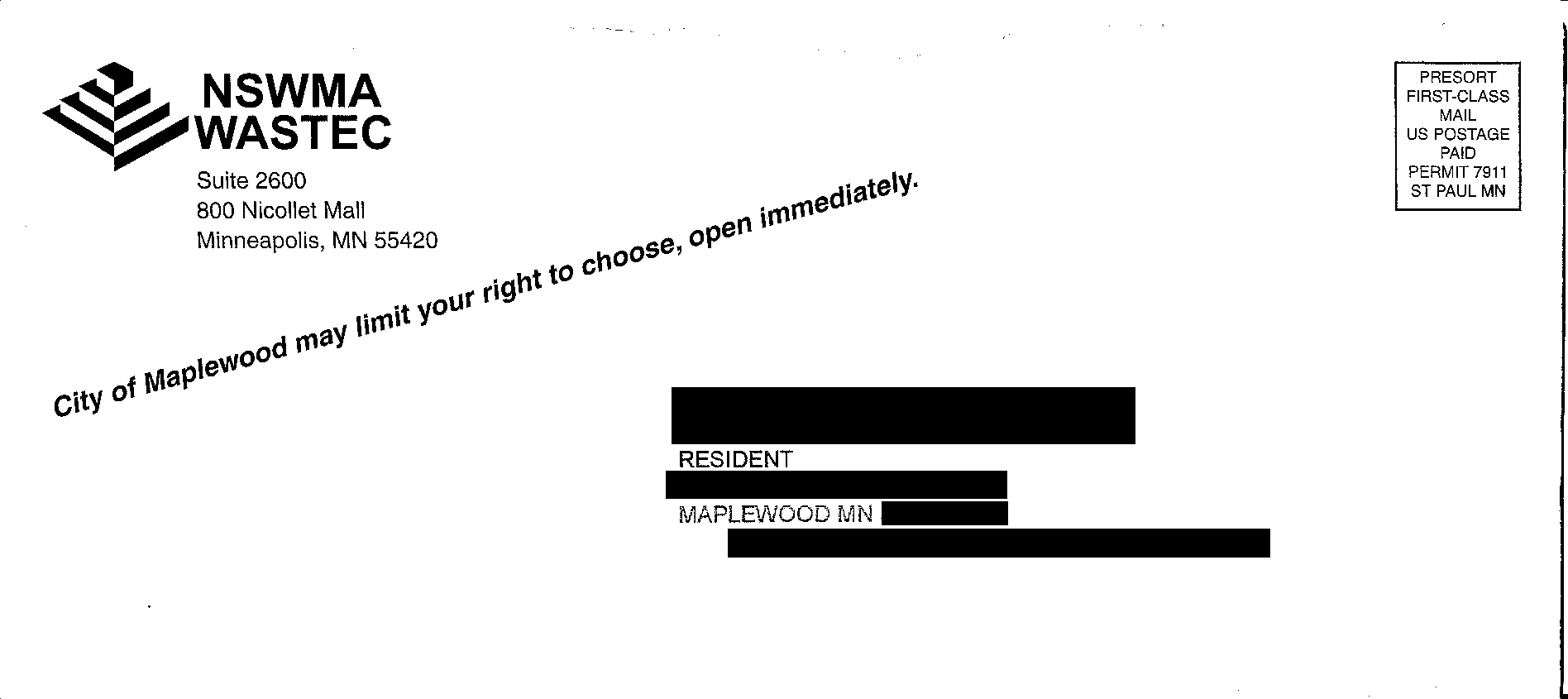Restraining Order
Labels: media, public safety
Labels: media, public safety

Labels: organized collection
Labels: media, organized collection
4. THE OPEN MARKET IS CONSTANTLY INNOVATING FOR THE BENEFIT OF CUSTOMERS IN LIGHT OF PRESSURE OF IMMEDIATE AND CONSTANT COMPETITION.
• An open market with competition is the best way to drive innovation, efficiency, and value. Value is not just price, but the combination of price, service, and environmental protection.
• Private sector waste companies are innovators in reducing truck emissions.
• Today's private sector hauling fleet puts "more rubber on the ground" effectively spreading the total load across the road. With open hauling this advantage is increased.
• Private haulers have supported the separate collection of yard waste for many years and designed collection systems that are efficient and customer friendly.
• Private haulers have been innovators in recycling programs and dramatically increased citizen participation in the amount of material recycled.
Labels: NSWMA Talking Points, organized collection
Labels: environment, organized collection, video
Labels: media, organized collection
3. CURRENT SYSTEM INVOLVES NO ADDITIONAL COST TO CITY
• No City consultant needed at a price of $60,000.
• No additional City staff needed for drafting, negotiating, monitoring, and enforcing contracts.
• No additional City staff needed to field complaints from citizens about contract hauler.
Administration of Collection System Contracts
During the November 2010 workshop, the city council inquired about the cost of administering a collection system contract. Administrative costs vary depending on how a contract is structured, i.e., whether the contractor or the city does the billing, customer complaints, education, etc. Using the administration of the city’s recycling contract as an example, the city budgets 20 percent of one employee’s time to this administration. This is equivalent to approximately $18,000 yearly.
Labels: NSWMA Talking Points, organized collection
Labels: organized collection
70% of Maplewood citizens in City conducted poll opposed government managed organized collection.
Over 1,000 households in Maplewood expressed their opposition to proceeding forward by sending postcards to the City Council before the special council meeting on October 4, 2010.
Labels: NSWMA Talking Points, organized collection
Labels: organized collection
Effective January 1, 2008, the City will be covering the fees for basic residential coverage. Should you have extra items beyond what can fit in your container, the fee is $1.50 per additional bag of waste; $13.00 per cubic yard of construction materials; and a small fee for toilets and porcelain/iron objects.Their "Garbage & Recycling" page has a more detailed list of what is picked up at no extra charge:
The following items will be picked up at no additional cost to you: yard waste, recycleables, couches, chairs, refrigerators, microwaves, dishwashers, water heaters, televisions, tables, ovens, desks, and other large household items.
Typical items that are collected at no charge are:The hauler, Veolia, does charge the residents quarterly -- but only for the Washington County Solid Waste Tax. Perhaps that tax increased at some point, and that anecdote is the basis of the resident's testimony. But of course, the same increase would have been applied to customers of haulers in open system cities in the same county at the same time.
- Large metal household items including refrigerators, freezers, microwaves, humidifiers, stoves, dishwashers, washers and dryers, water heaters, furnaces, air conditioners, televisions, and water softeners
- Household items too large to place in container, such as counches, sofas, chairs, dressers, beds, mattresses, desks, and tables
Labels: organized collection
Many residents believe the competitive market will provide the best value (price and service) for any service they need.
Many residents have expressed their lack of confidence in government to provide long-term value (price and service).
Labels: NSWMA Talking Points, organized collection
Labels: organized collection
Labels: organized collection
Labels: finance, organized collection
Labels: organized collection, process

Labels: organized collection
Labels: finance
Labels: organized collection
2. ON BALANCE, RESIDENTS PREFER THE USE OF THEIR CHOSEN PRIVATE COMPANIES FOR HAULING SERVICES.
• Freedom of choice is very important to residents.
• Many residents prefer to make buying decisions without influence of government.
• The open market allows residents to easily switch haulers when they are not happy.
Labels: NSWMA Talking Points, organized collection
Labels: events, public safety
• A privately-held infrastructure has been built to serve this community need.
• Government intervention will result in loss of investments made by private companies without just compensation.
• Small haulers may be forced out of the community and lose customers through no fault of their own.
"Large, multinational conglomerates headquartered in other states and foreign countries may lose customers through their unwillingness or inability to compete."
Labels: NSWMA Talking Points, organized collection
 In the "The Adventure of Silver Blaze," Sherlock Holmes calls attention to “the curious incident of the dog in the night-time." When Inspector Gregory responds, "The dog did nothing in the night-time," Holmes explains, "That was the curious incident." The dog didn't bark because he knew the intruder.
In the "The Adventure of Silver Blaze," Sherlock Holmes calls attention to “the curious incident of the dog in the night-time." When Inspector Gregory responds, "The dog did nothing in the night-time," Holmes explains, "That was the curious incident." The dog didn't bark because he knew the intruder. Labels: organized collection
Labels: finance
Labels: media, public safety
• Customers have developed personal relationships with their haulers.
Labels: NSWMA Talking Points, organized collection
Five people were killed last week in five separate accidents involving garbage trucks. Please be careful on the route!!!!!!
8:23 AM Dec 14th, 2010 via Facebook
Labels: organized collection, public safety
1. THE CURRENT FREE ENTERPRISE BASED CUSTOMER-CHOICE HAULING SYSTEM SUPPORTS A LONG-STANDING TRADITION OF SERVICE BY PRIVATE INDUSTRY.
Labels: NSWMA Talking Points, organized collection
Labels: NSWMA Talking Points, organized collection
Labels: organized collection
Labels: organized collection
Acute exposure to diesel exhaust may cause irritation to the eyes, nose, throat and lungs, some neurological effects such as lightheadedness. Acute exposure may also elicit a cough or nausea as well as exacerbate asthma. Chronic exposure in experimental animal inhalation studies have shown a range of dose dependent lung inflammation and cellular changes in the lung and there are also diesel exhaust immunological effects. Based upon human and laboratory studies, there is considerable evidence that diesel exhaust is a likely carcinogen.
Labels: environment, organized collection
Labels: parks
Labels: organized collection
Labels: media, public safety
Labels: organized collection
Labels: development, media
Labels: organized collection
| Newer Posts | Older Posts |
